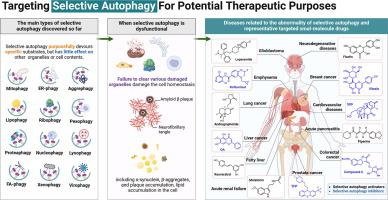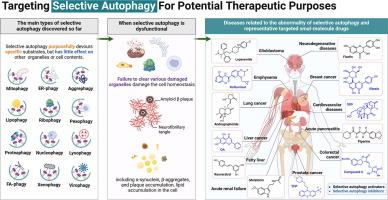Targeting selective autophagy and beyond: From underlying mechanisms to potential therapies
IF 11.4
1区 综合性期刊
Q1 MULTIDISCIPLINARY SCIENCES
引用次数: 0
Abstract
Background
Autophagy is an evolutionarily conserved turnover process for intracellular substances in eukaryotes, relying on lysosomal (in animals) or vacuolar (in yeast and plants) mechanisms. In the past two decades, emerging evidence suggests that, under specific conditions, autophagy can target particular macromolecules or organelles for degradation, a process termed selective autophagy. Recently, accumulating studies have demonstrated that the abnormality of selective autophagy is closely associated with the occurrence and progression of many human diseases, including neurodegenerative diseases, cancers, metabolic diseases, and cardiovascular diseases.
Aim of Review
This review aims at systematically and comprehensively introducing selective autophagy and its role in various diseases, while unravelling the molecular mechanisms of selective autophagy. By providing a theoretical basis for the development of related small-molecule drugs as well as treating related human diseases, this review seeks to contribute to the understanding of selective autophagy and its therapeutic potential.
Key Scientific Concepts of Review
In this review, we systematically introduce and dissect the major categories of selective autophagy that have been discovered. We also focus on recent advances in understanding the molecular mechanisms underlying both classical and non-classical selective autophagy. Moreover, the current situation of small-molecule drugs targeting different types of selective autophagy is further summarized, providing valuable insights into the discovery of more candidate small-molecule drugs targeting selective autophagy in the future. On the other hand, we also reveal clinically relevant implementations that are potentially related to selective autophagy, such as predictive approaches and treatments tailored to individual patients.


瞄准选择性自噬及其他:从基本机制到潜在疗法
背景:自噬是真核生物细胞内物质的一种进化保守的周转过程,依赖于溶酶体(动物)或液泡(酵母和植物)机制。在过去二十年中,新出现的证据表明,在特定条件下,自噬可针对特定的大分子或细胞器进行降解,这一过程被称为选择性自噬。最近,越来越多的研究表明,选择性自噬的异常与许多人类疾病的发生和发展密切相关,包括神经退行性疾病、癌症、代谢性疾病和心血管疾病:本综述旨在系统、全面地介绍选择性自噬及其在各种疾病中的作用,同时揭示选择性自噬的分子机制。综述的主要科学概念:在这篇综述中,我们系统地介绍和剖析了已发现的选择性自噬的主要类别。我们还重点介绍了在理解经典和非经典选择性自噬的分子机制方面的最新进展。此外,我们还进一步总结了针对不同类型选择性自噬的小分子药物的现状,为未来发现更多针对选择性自噬的候选小分子药物提供了宝贵的见解。另一方面,我们还揭示了可能与选择性自噬有关的临床相关实施方案,如预测方法和针对个体患者的治疗方案。
本文章由计算机程序翻译,如有差异,请以英文原文为准。
求助全文
约1分钟内获得全文
求助全文
来源期刊

Journal of Advanced Research
Multidisciplinary-Multidisciplinary
CiteScore
21.60
自引率
0.90%
发文量
280
审稿时长
12 weeks
期刊介绍:
Journal of Advanced Research (J. Adv. Res.) is an applied/natural sciences, peer-reviewed journal that focuses on interdisciplinary research. The journal aims to contribute to applied research and knowledge worldwide through the publication of original and high-quality research articles in the fields of Medicine, Pharmaceutical Sciences, Dentistry, Physical Therapy, Veterinary Medicine, and Basic and Biological Sciences.
The following abstracting and indexing services cover the Journal of Advanced Research: PubMed/Medline, Essential Science Indicators, Web of Science, Scopus, PubMed Central, PubMed, Science Citation Index Expanded, Directory of Open Access Journals (DOAJ), and INSPEC.
 求助内容:
求助内容: 应助结果提醒方式:
应助结果提醒方式:


